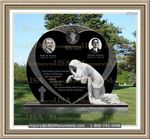|
Basics You Should Learn When Considering Traditions For Jewish Funeral
According to Jewish funeral traditions, the deceased should never be left unattended. A watchmen, or "Shomer" stays with the body from death until the funeral and burial. Usually the family will stay with the deceased as well. The first person to call upon a death is the rabbi, who will set the time of the funeral. Funerals are held in the synagogue or temple, however many modern Jewish families are opting for graveside services only.
The Jewish custom calls for a closed casket and no viewing of the body because it is disrespectful to look at a person that is unable to look back.
Embalming, a process used for sanitation and temporary preservation, is avoided unless it is required by local law. The sacred society, or the Chevra Kadisha usually take on the role of preparing the body. This is a group of pious Jewish followers who perform the Jewish Taharah, or purification.
They bathe the body and dress it in the Tachrichim, which is the traditional burial garment. It is a simple shroud without any pockets. This symbolizes to all that the deceased does not take any material possessions with them when they leave this world and that God will judge them based on their merits and deeds alone.
While families choose their own caskets, Jewish tradition calls for unadorned caskets made of wood that contain no metal. The family also decides on funeral details, but there are typically no floral arrangements as this is seen as unnecessary and frivolous.
The actual funeral itself lasts around 20 or 30 minutes and consists of a reading of Psalms, other Scripture readings, and the eulogy. Either before or after the services, mourners perform K'riah, the rendering of the garment. While some mourners will tear their clothes, many people today simply attach a black ribbon to their clothing. As you can see, there are many Jewish funeral traditions that mourners of other faiths do not follow.
|
|



























